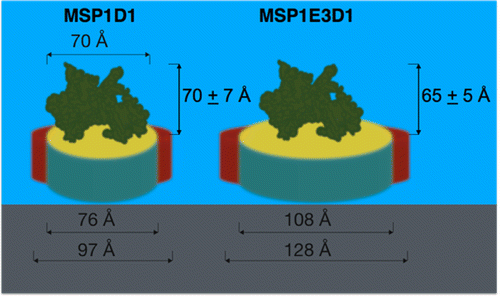Nanodisc films for Membrane Protein Studies
Nanodisc Films for Membrane Protein Studies by Neutron Reflection: Effect of the Protein Scaffold Choice
by Nicolas Bertram, Tomas Laursen, Robert Barker, Krutika Bavishi, Birger Lindberg Møller, and Marité Cárdenas.
Langmuir, 2015, 31 (30), pp 8386–8391 DOI: 10.1021/acs.langmuir.5b00936
Abstract:
Nanodisc films are a promising approach to study the equilibrium conformation of membrane bound proteins in native-like environment. Here we compare nanodisc formation for NADPH-dependent cytochrome P450 oxidoreductase (POR) using two different scaffold proteins, MSP1D1 and MSP1E3D1. Despite the increased stability of POR loaded MSP1E3D1 based nanodiscs in comparison to MSP1D1 based nanodiscs, neutron reflection at the silicon–solution interface showed that POR loaded MSP1E3D1 based nanodisc films had poor surface coverage. This was the case, even when incubation was carried out under conditions that typically gave high coverage for empty nanodiscs. The low surface coverage affects the embedded POR coverage in the nanodisc film and limits the structural information that can be extracted from membrane bound proteins within them. Thus, nanodisc reconstitution on the smaller scaffold proteins is necessary for structural studies of membrane bound proteins in nanodisc films.

